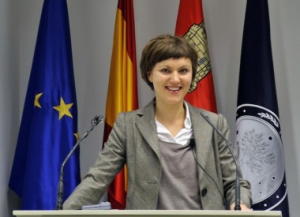Event Date:
Event Location:
- SSMS 2135
Magdalena Wojcieszak
Associate Professor, Amsterdam School of Communication Research (ASCoR), University of Amsterdam
Co-Sponsored by the Departments of Political Science, Communication,and Film and Media Studies
Although researchers have been interested in whether and when ostensibly non-political, fictional programming influences viewers’ political perceptions and policy preferences, systematic evidence has been limited. The theories applied to explaining these potential influences focus on transportation (Green et al., 2004), and such sub-concepts as identification, sympathy, or immersion into the plot, factors that are frequently measured, but seldom manipulated (but de Graaf et al., 2012). This presentation will suggest a less demanding theoretical framework rooted in the exemplification theory (Zillmann 1999; 2002). When asked questions about policies, people bring to mind the people likely to be affected by these policies. By making some exemplars more accessible than others, fictional television programming may influence political attitudes and beliefs. I describe a project, jointly with Diana Mutz (University of Pennsylvania), in which we evaluate whether minor differences in character portrayals, namely slight manipulations in the exemplars, affect viewers’ perceptions and policy preferences. We rely on a combination of factorial and switching replication designs in which a representative sample of Americans watched one of four versions of an episode of Law and Order: Special Victims’ Unit edited to manipulate the alleged rape victim’s sexual history and the jury verdict regarding the alleged perpetrator, or an episode of an unrelated program. Subtle variations in the exemplars influence viewers’ attitudes towards four issues: evidence in rape cases, confidence in the justice system, immigration policy, and support for changing the health care system. Our findings suggest that fictional programs need not be explicitly didactic in order to influence political views; in fact, exemplars of people and events may be more influential when they are incidental to the plotline.
Magdalena Wojcieszak (Ph.D., Annenberg School for Communication/University of Pennsylvania) is an Associate Professor of Political Communication at the Amsterdam School of Communication Research (ASCoR), University of Amsterdam. Her research focuses on political communication, public opinion, and the effects of mass and new media on citizens’ attitudes, behaviors, and perceptions.

